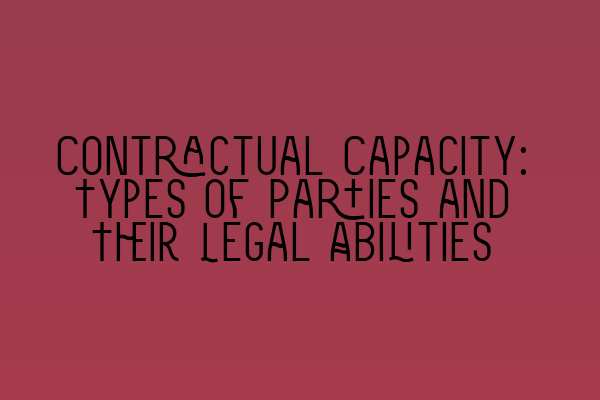Contractual Capacity: Types of Parties and Their Legal Abilities
In the realm of contract law, the legal concept of contractual capacity plays a vital role in determining the enforceability of agreements. Contractual capacity refers to the legal ability of parties to enter into a contract and to be bound by its terms. Understanding the types of parties and their respective legal abilities is crucial in evaluating the validity and enforceability of a contract.
Types of Parties
When it comes to contractual capacity, parties can be categorized into three main types: individuals, corporations, and minors.
Individuals
Individuals, also known as natural persons, are the most common type of party in contracts. As legally competent individuals, they possess full contractual capacity, meaning they are free to enter into contracts and be legally bound by their terms. However, there are certain circumstances where individuals may lack full contractual capacity, such as when they are under the influence of drugs or alcohol, mentally incapacitated, or have been declared bankrupt.
If you’re interested in learning more about interpreting contractual clauses and unlocking their hidden meanings, I recommend reading our related article: Interpreting Contractual Clauses: Unlocking the Hidden Meanings.
Corporations
Corporations, unlike individuals, are legal entities created for specific purposes. They have separate legal personalities from their members, allowing them to enter into contracts on their own behalf. Corporations usually have full contractual capacity, but their ability to bind themselves is limited by their constitutional documents such as the company’s memorandum and articles of association. It’s essential to understand the internal rules and limitations of the specific corporation you’re dealing with before entering into a contract.
If you’re a student struggling with complex contract law concepts, be sure to check out our informative tutorials: Contract Law Tutorials: Simplifying Complex Concepts for Students.
Minors
Minors, individuals under the age of majority, also have a role in contract law. Generally, minors lack full contractual capacity due to their inherent vulnerability and the need for protection. As a result, contracts entered into by minors are considered voidable, meaning they can be enforced or voided at the option of the minor. However, there are situations where a minor may be bound by a contract, such as for necessities like food, clothing, and shelter.
To gain a deeper understanding of the implications and boundaries of third-party rights in contract law, don’t miss our article: Exploring Third Party Rights in Contract Law: Implications and Boundaries.
Legal Abilities of Parties
Capacity to Contract
Contractual capacity encompasses the ability to understand the nature and consequences of the contract. It involves comprehending the rights, obligations, and risks associated with entering into an agreement. Parties must have the mental and intellectual capability to make informed decisions and give their consent freely and voluntarily. Without such capacity, a contract may be deemed void or voidable.
The Doctrine of Privity
A legal principle closely related to contractual capacity is the doctrine of privity, which states that only parties to a contract can enforce or be bound by its terms. This means that individuals who are not party to a contract, such as third parties, generally do not have legal standing to enforce the agreement. However, there are exceptions to this rule, such as when a contract confers a benefit or imposes an obligation on a third party.
If you’re interested in exploring more about contractual obligations and navigating the responsibilities of parties, check out our comprehensive article: Contractual Obligations: Navigating the Responsibilities of Parties.
Conclusion
Contractual capacity is a fundamental aspect of contract law that determines the validity and enforceability of agreements. Understanding the types of parties and their legal abilities is vital in evaluating whether a party has the capacity to enter into a contract. It’s crucial to seek legal advice to ensure that your contracts are drafted and executed with full consideration of all relevant legal principles and requirements.
To learn more about contract law and related topics, be sure to explore our website and read our informative articles like Discharge of Contracts: Modes and Consequences Explained.
